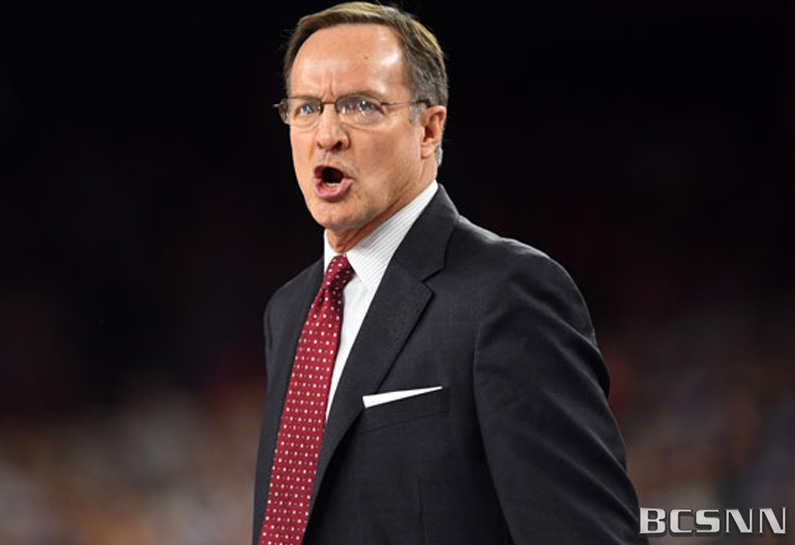Following 35 years of consistent winning as a head coach – including 10 seasons at the University of Oklahoma – Lon Kruger announced his retirement Thursday.
Throughout his three-and-a-half decades as a Division I head coach, Kruger proved to be one of the most dependable coaches in college basketball. He was the first coach to take five different schools to the NCAA Tournament and is the only coach to win an NCAA Tournament game with five programs. He is also the only coach since the NCAA Tournament expanded to 64 teams in 1985 to take four programs to the Sweet 16 or beyond.
More important than the success of his teams is the manner in which Kruger led them. Known throughout the coaching circles as one of the kindest and most genuine leaders in the industry, Kruger built his career on the foundation of hard work, humility, integrity and service.
Kruger concludes his collegiate coaching career with a 674-432 (.609) overall record, including a 195-128 (.604) performance in his 10 years at Oklahoma. Kruger’s 674 Division I wins are the 27th most all-time and were the 10th most among active coaches at the time of his retirement.
A staple of the postseason, Kruger’s teams reached 20 NCAA Tournaments, advancing to the Sweet 16 five times and clinching Final Four berths in 1994 (Florida) and 2016 (Oklahoma).
Named the 14th head coach in OU history on April 1, 2011, Kruger was handed the challenging task of turning around a program which had gone 27-36 (.429) in the two seasons prior to his arrival. Over the next decade, Kruger guided Oklahoma to seven NCAA Tournaments (only missing the Big Dance once since his second season), two Sweet 16s and the 2016 Final Four. His 195 victories are the fourth most by an OU head coach.
Under Kruger, Sooner players earned first-team All-Big 12 selections on six occasions and racked up 32 Academic All-Big 12 honors. Kruger mentored numerous national stars, most notably 2016 National Player of the Year Buddy Hield and 2018 National Freshman of the Year Trae Young.
Four Sooners were drafted into the NBA during Kruger’s tenure, and two of them were among the top six picks (Hield and Young).
In addition to his time at Oklahoma, Kruger served as the head coach at Texas-Pan American (1982-86), Kansas State (1986-90), Florida (1990-96), Illinois (1996-2000) and UNLV (2004-05). He also saw a four-year stint in the NBA – three as head coach of the Atlanta Hawks (2000-03) and one as a New York Knicks assistant (2003-04).
What makes Kruger’s success at multiple schools even more impressive is the condition of the programs when they hired him and the rebuilding jobs he faced at each. In the year before his arrival as head coach at his six stops, the programs had combined for a 78-99 record (.441). Kruger’s teams went a combined 92-89 (.508) in his first year at those schools, 117-72 (.619) in his second year, 114-74 (.606) in his third year and 115-49 (.697) in his fourth season. He directed all six programs to 20-win campaigns and took each of the last five to the NCAA Tournament.
Immediately prior to coming to Norman, Kruger compiled a 161-71 (.694) record in seven years at UNLV. He coached the Runnin’ Rebels to the NCAA Tournament four of his last five seasons after the program appeared in only two of the previous 15 tournaments. He took over a UNLV program in 2004 that had gone through a period of significant instability with nine different head coaches in a 13-year span.
Kruger began his head coaching career in the 1982-83 season at Texas-Pan American (now UTRGV), where he compiled a four-year mark of 52-59, including a 20-8 record in the final season. He was inducted into the UTRGV Athletics Hall of Fame in 2018.
From there he left for his alma mater of Kansas State where he was 81-46 (.638) in four seasons. Each of his K-State squads qualified for the NCAA Tournament, and the 1988 team was one of the best in the school’s history with 24 wins and a trip to the Elite Eight.
When Kruger took the Florida job in 1990, the Gators were coming off of a 7-21 season. Four years into the role, Kruger guided UF to the 1994 Final Four. By pulling a similar turnaround at OU, Kruger is one of just two head coaches (also Rick Pitino with Kentucky and Louisville) to inherit two teams coming off a sub-.500 year and take both to the Final Four within the first five seasons as head coach.
After six years at UF, he went to Illinois for a four-year run. His Illini teams were 81-48 (.628) with three NCAA Tournament appearances.
As a player, Kruger helped lead Kansas State to back-to-back Big Eight Conference titles in 1972 and 1973. He was honored as Big Eight Player of the Year in 1973 and 1974 while also being named an Academic All-American as a senior. In 2006, his No. 12 jersey was retired at Bramlage Colliseum.
Kruger was selected by the Atlanta Hawks in the ninth round of the 1974 NBA Draft. He also starred on the baseball diamond for Kansas State and was drafted by the Houston Astros in 1970 and the St. Louis Cardinals in 1974. An all-around athlete, Kruger even got some football notice after graduating from KSU when the Dallas Cowboys invited him to their 1974 rookie camp as a quarterback.
Kruger has been involved in a host of charities, especially the Coaches vs. Cancer program through the American Cancer Society. A council member of Coaches vs. Cancer since 2007, Kruger founded the Coaches vs. Cancer Las Vegas Golf Classic in 2008 and has helped net over $7 million throughout the last 13 years.
In 2017, Kruger was a recipient of the American Cancer Society’s prestigious St. George National Award for his extraordinary service to the community in support of the Society’s mission to save lives and lead the fight for a world without cancer. He was also recognized in 2012 with the Coaches vs. Cancer Champion Award.
He plans to continue the event and maintain heavy involvement in Coaches vs. Cancer and the American Cancer Society.
Kruger’s accolades both on and off the court have earned him multiple recognitions over recent years. He was the 2019 recipient of the John R. Wooden Legends of Coaching Award and honored in 2017 with the National Association of Basketball Coaches (NABC) Metropolitan Award for long and outstanding service to men’s college basketball.




























